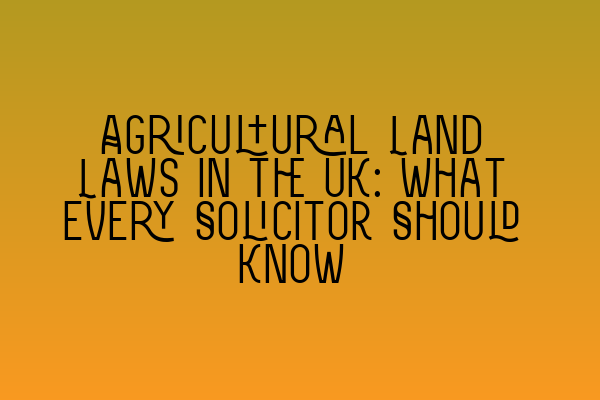Agricultural Land Laws in the UK: What Every Solicitor Should Know
Agricultural land plays a vital role in the UK’s economy and society, and as a solicitor specializing in property law and land law, it is essential to have a comprehensive understanding of the legal framework surrounding agricultural land. This blog post aims to provide solicitors with valuable insights into the key aspects of agricultural land laws in the UK.
The Definition of Agricultural Land
Before delving into the details, let’s begin by defining agricultural land. In the UK, agricultural land refers to any land that is used for farming, horticultural activities, or the rearing of livestock. The classification of agricultural land is crucial as it determines the legal rules and regulations applicable to its use and ownership.
The Importance of Agricultural Tenancies
One significant aspect of agricultural land law is the existence of agricultural tenancies. Agricultural tenancies provide farmers with the legal right to occupy and use agricultural land for agricultural purposes. As a solicitor, it is crucial to understand the different types of agricultural tenancies, such as the Agricultural Holdings Act 1986 tenancies and the Farm Business Tenancies introduced under the Agricultural Tenancies Act 1995.
Understanding the intricacies of agricultural tenancies will enable solicitors to provide effective legal advice to both landlords and tenants, ensuring their rights and obligations are properly protected and enforced.
Agricultural Subsidies and Grants
Another vital consideration when dealing with agricultural land is the availability of subsidies and grants. The UK government provides financial support to farmers through various subsidy schemes, such as the Basic Payment Scheme (BPS) and the Environmental Stewardship Scheme (ESS). As a solicitor, it is essential to keep up-to-date with the latest developments in these schemes and understand how they impact agricultural land transactions.
Being knowledgeable about agricultural subsidies and grants will enable solicitors to advise clients on the potential benefits and obligations associated with these schemes and help them make informed decisions regarding their agricultural land investments.
Restrictions on Agricultural Land
Various restrictions and regulations govern the use of agricultural land in the UK. These include planning restrictions, environmental protections, and compliance with agricultural regulations. Solicitors dealing with agricultural land must have an in-depth understanding of these restrictions to guide clients through the legal requirements and implications.
It is crucial to advise clients on planning permission requirements for agricultural developments and any associated environmental impact assessments. Additionally, solicitors should be well-versed in regulations surrounding agricultural practices, such as animal welfare, pesticide usage, and pollution prevention.
Agricultural Land Sales and Purchases
As a solicitor, you will likely be involved in the buying or selling of agricultural land on behalf of your clients. Understanding the legal process for agricultural land transactions is essential to ensure a smooth and successful transaction.
Key considerations for solicitors during agricultural land sales and purchases include verifying land ownership, conducting searches to identify any potential issues or restrictions, negotiating contracts, and ensuring compliance with relevant regulations. Solicitors should also be familiar with the rules surrounding subsidies and grants, as they may impact the value and terms of the transaction.
Conclusion
Being well-versed in agricultural land laws is essential for solicitors specializing in property law and land law. By understanding the definition of agricultural land, agricultural tenancies, subsidies and grants, restrictions, and the legal process for land transactions, solicitors can provide valuable and comprehensive legal advice to their clients in the agricultural sector.
If you’re planning to pursue a career in property law and land law, it is essential to stay updated with the latest developments and regulations. SQE Property Law & Land Law offers comprehensive SQE preparation courses to help aspiring solicitors succeed in their legal careers. Check out their SQE 1 Practice Exam Questions and SQE 1 Practice Mocks FLK1 FLK2 to enhance your knowledge and skills.
For more information on SQE preparation and exam dates, visit SQE 2 Preparation Courses and SQE 1 Preparation Courses. Stay ahead in your legal journey with SQE Property Law & Land Law.
Remember, a strong foundation in agricultural land laws is the key to becoming a successful solicitor in property law and land law.
